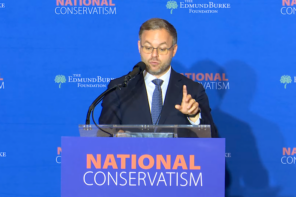At oral argument in Sebelius v. Hobby Lobby Stores, Inc. and Conestoga Wood Specialties, Inc. v. Sebelius this morning, the Supreme Court justices spent a great deal of time questioning the lawyers in the case about whether corporations have a religious conscience, and whether Congress intended to protect it when enacting the 1993 Religious Freedom Restoration Act (RFRA).
What was most striking, though, was how all three female justices, Sonia Sotomayor, Elena Kagan, and Ruth Bader Ginsburg, fired the most challenging questions at the companies’ lawyer, Paul Clement, confronting the essential underpinnings of his clients’ claims.
In particular, they questioned whether RFRA was intended to cover corporations, whether a party can claim a religious exemption if granting it impacts the rights of others (in this case, the companies’ employees) and whether, as the companies assert, the Affordable Care Act’s regulation on coverage for preventative care is actually accurately termed a “mandate.”
Sotomayor, after noting that “we’ve never really considered a for-profit corporation as exercising religion,” asked whether “there is another choice of paying the tax” rather than providing a group health plan. (For more on the intricacies of that argument, see this post about Georgetown Law professor Marty Lederman, who first raised it last year.)
In short, contrary to Hobby Lobby’s claims that not offering the coverage would subject it to ruinous fines, the regulation merely imposes a tax. Should a company choose to offer no group health plan at all, it would pay the tax, which, Kagan argued, is less than a cost of a group health plan. What’s more, she argued, even if the company offered higher wages to its employees to purchase insurance through the ACA’s exchanges, it would still pay less than offering a plan.
Although Chief Justice John Roberts asked whether offering health insurance to its employees was part of Hobby Lobby’s religious commitment, other justices were skeptical. Ginsburg shot back that “provision of health care is not a religious tenet,” and Kagan distinguished between “wanting to be a good employer” and “saying your religious beliefs” compel providing a health insurance plan.
Solicitor General Donald Verrilli, arguing the government’s position, highlighted that if the Court ruled for Hobby Lobby, it would mark the first time a court granted an exemption that “extinguishe[d] the statutorily guaranteed benefits” of someone else: Hobby Lobby’s employees. As Kagan noted, “Congress has made a judgement to provide an entitlement,” in other words, the birth control coverage, “and that entitlement is to women” who are “harmed” if they are denied it. Justice Anthony Kennedy, thought to be the swing vote, asked Clement, “how would you suggest we think about the rights of employees?”, noting that their religious beliefs might not square with those of their employer. But Justice Antonin Scalia questioned whether RFRA was even intended to take into account the interests of third parties at all.
It was hard not to sense that somehow, if the coverage had been for something other than contraceptives — say, as Sotomayor pressed several times, vaccinations or blood transfusions — the question of the impact on employees might have been treated differently.
That was evident, too, in Scalia’s flip dismissal of the costs of the contraceptive methods that Hobby Lobby objects to. Unlike Catholic plaintiffs, Hobby Lobby seeks an exemption from covering ella, Plan B, and IUDs, claiming that they may cause an abortion. Scalia declared these methods “not terribly expensive.” But Verilla pointed out that the IUD, one of the most effective methods of birth control, is also one of the most expensive. (They can cost as much as $1,000.)
As expected, the Court did not question in any depth the companies’ claim that these methods are abortifacients. But in response to a hypothetical raised by Kennedy to Verrilli, that his reasoning would permit the government to mandate that religious entities pay for abortions, Chief Justice John Roberts betrayed his view: “Isn’t that what we’re talking about?”
Verrilli, though, accurately noted that no federal law requires anyone to pay for abortions. That, actually, is a testament to how successful religious conservatives have been in getting statutory and regulatory exemptions, and Verrilli repeatedly pointed out that a Hobby Lobby win here would vastly expand that universe to corporations. Although houses of worship are exempt from the regulation, the Obama administration granted religious non-profits an accommodation that shifts the onus of providing coverage to the insurer—without any adverse impact on the employees. The justices questioned Clement about whether such an arrangement would satisfy his clients, but he was non-committal. (Religious non-profits have also brought RFRA claims against the accommodation.)
The argument wasn’t over, though, without a kosher butcher analogy. This one was raised by Justice Samuel Alito, who pointed to a Danish effort that would close kosher and halal slaugherhouses through a law that would ban killing an animal without stunning it first. Verrilli described that law as “targeted” at religion in a way the ACA is not. But, Verrilli noted, the contraception benefit is different, as is the companies’ objection. In this case, Verrilli argued, the rights of the employees of Hobby Lobby and Conestoga Wood “take center stage.”




